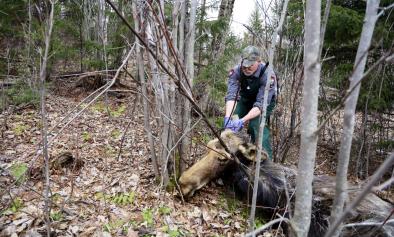Science Source
Relative effects of climate change and wildfires on stream temperatures: a simulation modeling approach in a Rocky Mountain watershed
- States that freshwater ecosystems are warming globally from the direct effects of climate change on air temperature and hydrology and the indirect effects on near-stream vegetation
- Holds that vegetative change may be especially rapid in fire-prone landscapes, causing significant local stream temperature increases
- Links a spatially explicit landscape fire and vegetation model (FireBGCv2) to an empirical regression equation that predicted daily stream temperatures to explore how climate change and its impacts on fire might affect stream thermal conditions across a partially forested, mountainous landscape in the western U.S.
- Uses the model to understand the roles that wildfire and management actions such as fuel reduction and fire suppression could play in mitigating stream thermal responses to climate change
- Results indicate that air temperature increases associated with future climates could account for a much larger proportion of stream temperature increases (as much as 90 % at a basin scale) than wildfire
- Finds, however, at finer spatial and temporal scales stream temperatures were sensitive to wildfire
- Concludes that although wildfires will continue to cause local, short-term effects on stream temperatures, managers of aquatic systems may need to find other solutions to cope with the larger impact from climate change on future stream warming that involves adapting to the increases while developing broad strategies for riparian vegetation restoration
Related Content
Science Source
| Global Change Biology
Decadal-scale phenology and seasonal climate drivers of migratory baleen whales in a rapidly warming marine ecosystem
Daniel E. Pendleton, Morgan W. Tingley, Laura C. Ganley et al
Headline

May 19, 2022 | Climate Nexus Hot News
Climate Change Great For Winter Ticks, Very Bad For Moose Calves
Science Source
Climate change increases cross-species viral transmission risk
Colin J. Carlson, Gregory F. Albery, Cory Merow et al
Science Source
| Journal of Animal Ecology
Climate change affects bird nesting phenology: Comparing contemporary field and historical museum nesting records
John M. Bates, Mason Fidino, Laurel Nowak-Boyd et al


